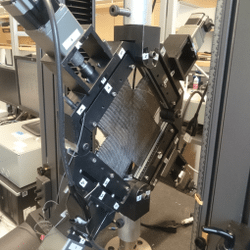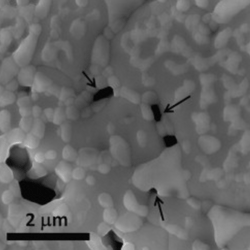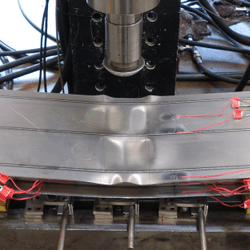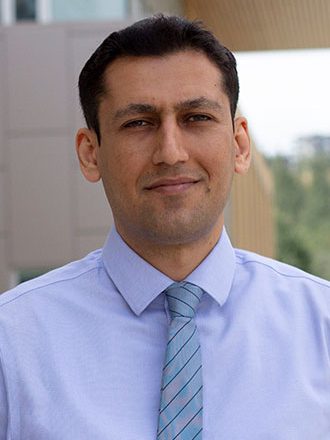The Aerospace and Transportation Materials and Manufacturing (ATMM) pillar primarily conducts research in the following areas: additive manufacturing, automation and control for automotive applications, defect characterization of engineering materials via 3D X-ray imaging, multi-phase flow: applications and fundamentals, material joining/welding techniques, mathematical modelling (FEA/CFD) of manufacturing processes, multi-scale modelling of structure-processing-properties relationships, structural health monitoring of processes and structures, thermo-chemo-mechanical characterization of lightweight alloys and composite materials, and thermal management and cooling technologies for power electronics.

Combined bi-axial and shear testing of a woven composite (courtesy of Dr. Ababs Milani).

Creep-induced void nucleation in a ceramic composite (courtesy of Dr. Lukas Bichler).

Three-point bending testing of a sandwich beam (courtesy of Dr. Jasmin Jelovica).
Research Highlights

Birds such as bar-tailed godwits fly nonstop from Alaska to Australia while utilizing only a small amount of energy and navigating by unknown means. An aerial swarm of bats and birds maintains their trajectories and coordination with complex physical interaction. Flying bats can catch their prey in the dark with high precision. Within the theme of “breaking barriers of the impossible,” we present some research highlights of our in-house framework towards the development of futuristic bio-inspired intelligent and green flying vehicles. The framework emulates the natural flyers in the spirit of model, sense, learn and control by integrating various aspects of computational multiphysics with biology and artificial intelligence. The key component of the framework is to leverage high-fidelity physics-based modelling together with deep-learning-based reduced-order models. Finally, we provide some research directions towards the development of a physics-based digital twin of small-size flying vehicles.
Learn more about this research project Here.
Leads

Dr. Rajeev Jaiman
Associate Professor
Department of Mechanical Engineering
Vancouver Campus
rjaiman@mech.ubc.ca
Webpage

Dr. Mohammad Arjmand
Assistant Professor
School of Engineering
Okanagan Campus
mohammad.arjmand@ubc.ca
Webpage
Cluster News

May 06, 2018
UBC and Kal Tire’s Mining Tire Group have formed a research partnership that will allow the two organizations to collaborate in developing technology and innovative solutions for the mining tire industry.

Apr 10, 2018
UBC Okanagan researchers are using Canadian Nuclear Laboratories to conduct neutron beam testing to obtain highly accurate direct stress measurements and phase analysis of marine engine prototypes.

Feb 26, 2018
Last year, the Government of Canada launched a new Innovation Superclusters Initiative (ISI) under which it would invest up to $950 million over five years in industry-led consortia “with the greatest potential to energize the economy and become engines of growth.”

Feb 21, 2018
UBCO School of Engineering hosted the "1st Industry 4.0 School and Industry Night" on the 18th and 19th of February 2018 in Kelowna.

Jan 15, 2018
The Okanagan campus of the University of British Columbia hosts its 1st Industry 4.0 School & Industry Night on February 18 and 19, 2018.
